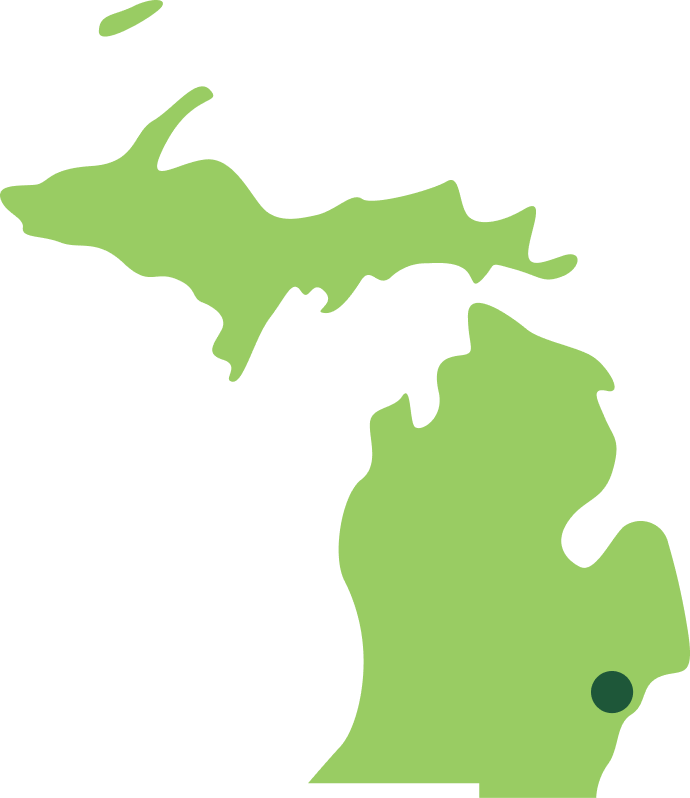Seeding Michigan’s food and farm future
Highlight
Seeding Michigan’s Food and Farm Future
Michigan
Michigan Good Food Fund, administered by Fair Food Network alongside a statewide lending network and 20-member stakeholder board, awarded 18 Michigan food and farm businesses a total of nearly $250,000 in 2024 as part of its annual Seed Awards program. Seed Awards are given to food entrepreneurs aligned with Michigan Good Food Fund’s Stakeholder Board investing performance targets. Awardees are located across the state, and these grants aim to help them prepare for financing or take their business to the next level. These grants represent not just financial investment, but an acknowledgment of the vital role farms and food distributors play in strengthening Michigan’s food value chain.
One of the dedicated entrepreneurs who received seed funding in 2024 is Danu Hof Family Farm. Danu Hof Family Farm is a beacon of sustainable farming and culinary commitment located just north of Mancelona in northern Michigan. Founded in 2017 by a couple with deep roots in hospitality and culinary arts, Caitlin McSweeney-Steffes and her husband, Lawrence McSweeney-Steffes Danu Hof has revitalized a piece of rural Michigan and contributed pigs, chickens, a wide array of vegetables, and culinary services like catering and cooking classes to the local food economy.
“We are both chefs originally and deeply rooted in our food system,” says McSweeney-Steffes. “We originally started because, being a part of the food system, we experienced how broken it can be.” She emphasizes the positive changes that the seed funding supports as the farm aims to expand its fresh produce offerings and broaden access to local, healthy foods. “We can send more local food to the schools in our community,” she says. “And we can allow greater access for those who participate in WIC, Senior Project Fresh, SNAP, and Double Up Food Bucks systems at our farm store and local farmers markets.”
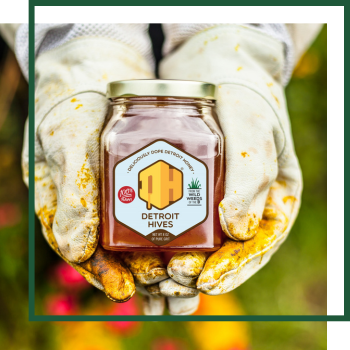 While Danu Hof Family Farm is expanding its operations to meet growing demand, other awardees, such as Detroit Hives, are creating awareness and educating their communities about improving physical and mental health through food. Detroit Hives co-founder, Tim Jackson, was dealing with a persistent health problem and turned to raw honey as a remedy. He and fellow co-founder, Nicole Lindsey, became intrigued by honey’s healing qualities and were convinced that bees and honey could not only be a key to improved health but also play a significant role in revitalizing Detroit’s decimated neighborhoods. Launching Detroit Hives in 2016, Jackson and Lindsey sought to educate their community about the importance of pollinators and local raw honey, and their impact within our local ecosystems. “Detroit Hives is addressing disparities within marginalized communities by using pollinator habitats to reactivate vacant properties and facilitate food security, positive health outcomes, and environmental justice,” says Jackson. “With support from the Michigan Good Food Fund, Detroit Hives is poised to continue its ongoing mission
While Danu Hof Family Farm is expanding its operations to meet growing demand, other awardees, such as Detroit Hives, are creating awareness and educating their communities about improving physical and mental health through food. Detroit Hives co-founder, Tim Jackson, was dealing with a persistent health problem and turned to raw honey as a remedy. He and fellow co-founder, Nicole Lindsey, became intrigued by honey’s healing qualities and were convinced that bees and honey could not only be a key to improved health but also play a significant role in revitalizing Detroit’s decimated neighborhoods. Launching Detroit Hives in 2016, Jackson and Lindsey sought to educate their community about the importance of pollinators and local raw honey, and their impact within our local ecosystems. “Detroit Hives is addressing disparities within marginalized communities by using pollinator habitats to reactivate vacant properties and facilitate food security, positive health outcomes, and environmental justice,” says Jackson. “With support from the Michigan Good Food Fund, Detroit Hives is poised to continue its ongoing mission 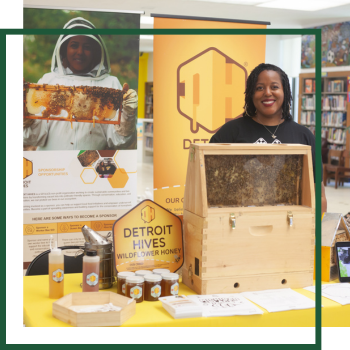 to improve underserved communities for both people and pollinators by transforming blighted vacant lots into thriving green spaces, while also working to address food insecurity, food safety, and economic mobility.”
to improve underserved communities for both people and pollinators by transforming blighted vacant lots into thriving green spaces, while also working to address food insecurity, food safety, and economic mobility.”
Danu Hof Family Farm and Detroit Hives were just two of the 18 Seed Award winners in 2024. The widespread interest in our Seed Awards program is a testament to the incredible talent and innovation within Michigan’s food and farm sector, as well as the need for such microgrants in the state’s food entrepreneurial community. “These businesses truly embody the mission of Michigan Good Food Fund, and we are excited to see the positive impact they will have on their communities in the coming years,” shared Aaron Jackson, Director of Michigan Good Food Fund at Fair Food Network.

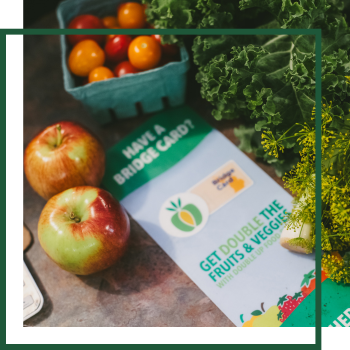 Double Up Food Bucks
Double Up Food Bucks Fair Food Network’s own Double Up Michigan team aims to help families bring home healthy fruits and vegetables while supporting Michigan farmers, in this case by working with grocers and food distribution networks to create more connections between what’s being grown locally and what’s available on store shelves. “Independent stores want to offer more fresh, local options, but they often don’t have the infrastructure, sourcing connections, or volume needed to access Michigan-grown produce consistently,” says Charles Walker, retail specialist. “They need support to bridge that gap—so they can be part of the solution in bringing healthy food closer to home.” Double Up Michigan aims to ensure the nearly 30 food retail locations in the city buy 20% or more locally grown produce during peak growing season in Michigan as a key requirement of being a part of the program. This helps build the market for Michigan farmers by driving demand for locally grown fruits and vegetables as part of the program model. Double Up Food Bucks in Michigan not only helps people using SNAP benefits but also supports farmer viability and keeps dollars circulating in local economies.
Fair Food Network’s own Double Up Michigan team aims to help families bring home healthy fruits and vegetables while supporting Michigan farmers, in this case by working with grocers and food distribution networks to create more connections between what’s being grown locally and what’s available on store shelves. “Independent stores want to offer more fresh, local options, but they often don’t have the infrastructure, sourcing connections, or volume needed to access Michigan-grown produce consistently,” says Charles Walker, retail specialist. “They need support to bridge that gap—so they can be part of the solution in bringing healthy food closer to home.” Double Up Michigan aims to ensure the nearly 30 food retail locations in the city buy 20% or more locally grown produce during peak growing season in Michigan as a key requirement of being a part of the program. This helps build the market for Michigan farmers by driving demand for locally grown fruits and vegetables as part of the program model. Double Up Food Bucks in Michigan not only helps people using SNAP benefits but also supports farmer viability and keeps dollars circulating in local economies. This
This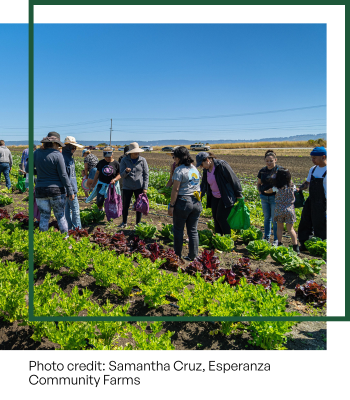 The Hub’s capacity building awards are one way that Fair Food Network is supporting partners who are scaling innovations that contend with nutrition insecurity. As program partners demonstrate the value of these innovations, they are shared with others in the field. “One of the reasons we started the program during the pandemic is because so many federally funded programs were experiencing the same challenges like how to pay for PPE or pivot operations to meet COVID protocols,” says Fair Food Network’s Senior Director of Nutrition Incentives, Erica Christensen Raml. “Since then, the focus of the fund has evolved to continue meeting the changing times. We have found that certain barriers to program usage — like transportation issues or language access — are common program-wide.”
The Hub’s capacity building awards are one way that Fair Food Network is supporting partners who are scaling innovations that contend with nutrition insecurity. As program partners demonstrate the value of these innovations, they are shared with others in the field. “One of the reasons we started the program during the pandemic is because so many federally funded programs were experiencing the same challenges like how to pay for PPE or pivot operations to meet COVID protocols,” says Fair Food Network’s Senior Director of Nutrition Incentives, Erica Christensen Raml. “Since then, the focus of the fund has evolved to continue meeting the changing times. We have found that certain barriers to program usage — like transportation issues or language access — are common program-wide.”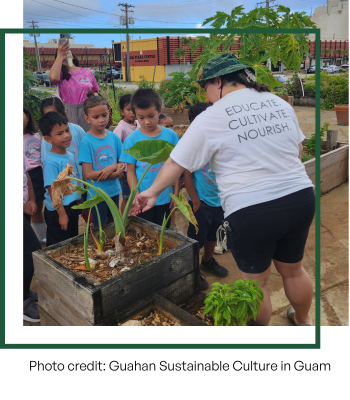 Together with our partners, Fair Food Network is supporting growing demand and helping nascent programs -— from Esperanza Community Farms in Watsonville, CA, to Knowledge Quest in Memphis, to Guahan Sustainable Culture in Guam — to explore innovative methods for service delivery and build organizational capacity to apply for and implement the large federal awards that make the impacts of nutrition incentive and produce prescription projects possible. And while each community’s program has the freedom to adapt to local needs, all — whether new or already established — are finding innovative ways to provide healthy food options for families who need it most, increase sales and expand the customer base for participating businesses, and produce more income for local farmers. “Capacity building grants give us a chance to provide additional support to communities that are innovating in scalable ways and can serve as models of resilience for the nutrition incentive field,” says Raml. “And they’re also a way to fund some really great ideas.”
Together with our partners, Fair Food Network is supporting growing demand and helping nascent programs -— from Esperanza Community Farms in Watsonville, CA, to Knowledge Quest in Memphis, to Guahan Sustainable Culture in Guam — to explore innovative methods for service delivery and build organizational capacity to apply for and implement the large federal awards that make the impacts of nutrition incentive and produce prescription projects possible. And while each community’s program has the freedom to adapt to local needs, all — whether new or already established — are finding innovative ways to provide healthy food options for families who need it most, increase sales and expand the customer base for participating businesses, and produce more income for local farmers. “Capacity building grants give us a chance to provide additional support to communities that are innovating in scalable ways and can serve as models of resilience for the nutrition incentive field,” says Raml. “And they’re also a way to fund some really great ideas.”

